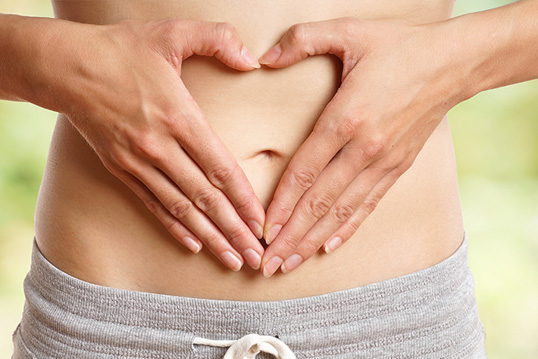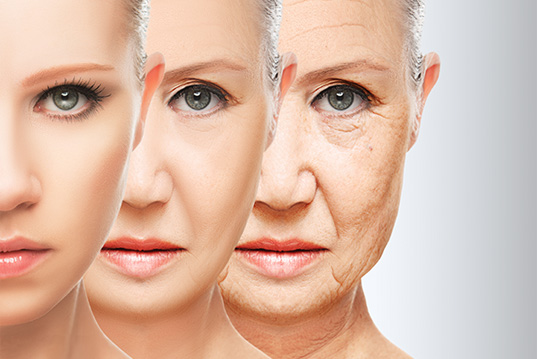Understanding the female aging process
Perimenopause , menopause and postmenopause are all terms that describe a woman’s change in hormone levels that typically come with age.

Perimenopause , menopause and postmenopause are all terms that describe a woman’s change in hormone levels that typically come with age.
This transition to menopause usually begins in a woman’s 40’s when her ovaries start making less estrogen and progesterone causing menstrual irregularity. This phase typically lasts three to four years and can be accompanied by symptoms of menopause.
When menstruation has stopped and levels of estrogen and progesetrone further decline, a woman has entered into menopause. Symptoms include hot flushes, night sweats, fatigue, vaginal dryness, mood swings, weight gain, fatigue, and low libido. On average, menopause will last five years.
A continued drop in estrogen levels with the absence of menstrual cycles is the postmenopause phase. This further decline in estrogen increases a woman’s risk for many conditions including osteoporosis and cardiovascular disease.
Complex connections between the brain and our endocrine glands which produce hormones make up the endocrime system which performs less optimally over time. In addition to Estrogen and Progesterone, other important hormones decline with age and begin their descent earlier than the menopausal transition. Some hormones rise with age leading to increased risk for illness and disease

This “Mother Steroid” is a precursor to many hormones including testosterone and estradiol. It also has a direct effect on your arteries, bone, and immune system. Levels peak in your mid-twenties and steadily decline with age.
In women, it is primarily derived from DHEA and affects libido, mood, cognitive function, bone health, and muscle mass and it gradually declines.
By stimulating the release of a hormone called Insulin-Like Growth Factor 1 (IGF-1), growth hormone has a potent muscle and bone building, immune-enhancing, and cardiovascular health-promoting effect.
The active component of your thyroid hormone is derived in the body less efficiently with age. Decreased levels occur with aging and are associated with depression, declining cognitive function, metabolism, and cardiovascular function.
Tissue resistance to insulin due to aging and poor lifestyle can result in rising levels which are associated with an increased risk of diabetes, cardiovascular disease, and cancer.
Our body’s response to stress over time can result in prolonged elevations of cortisol, which adversely affects body composition, cognitive performance, and immune system function.
A normal menstrual cycle goes through the process of preparing the uterus lining for the implantation of a fertilized egg. The pituitary gland starts by releasing the follicle stimulating hormone (FSH) to send a message to the ovaries to start producing estradiol. Then, estradiol leads the cells lining in the uterus to proliferate and thicken the uterine wall. This menstrual cycle occurs for 14 days, then the luteinizing hormone (LH) has a surge from the increased levels of estradiol to cause a release of an egg in the ovaries. This is known as ovulation. The cycle repeats itself every 28 days.


Menstrual irregularity and infertility develop as estrogen and progesterone levels start to decline with age. As women draw closer to menopause, menstrual cycles will become more irregular and menopausal symptoms start to occur, including hot flashes, decreased libido, dry skin, loss in memory, and decreased mood and energy. Menopause symptoms intensify and a woman will experience a loss in periods.
Post-menopause sets in approximately five years after menopause. This time is defined by lower estrogen levels, bone loss, and a breakdown of organ systems that can lead to health concerns. Fortunately, there are therapies that can help support hormone imbalances and symptoms that come with the reproductive aging process.
Bioidentical hormones are an important component of a tailor-made, comprehensive treatment program to address specific symptoms and improve deficiencies. Hormone therapy is not “one size fits all”. Patients have their own unique responses best addressed by an individually tailored regimen developed for each person. Optimized health is a complete package of proper nutrition and exercise, antioxidant therapy, and balanced bioidentical hormone replacement as needed.
Comprehensive review of symptoms, medical history, physical exam, blood tests, and biomarkers of aging.
Customise to balance hormone levels, replenish vitamins and nutrients, and recommend targeted therapies based on specific findings.
Meet with our exercise and nutrition expert Dr. Carreño who will design or fine-tune your health and fitness regimen.
Track changes in symptoms, blood levels and biomarkers of aging to evaluate your response and make necessary adjustments.